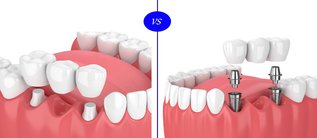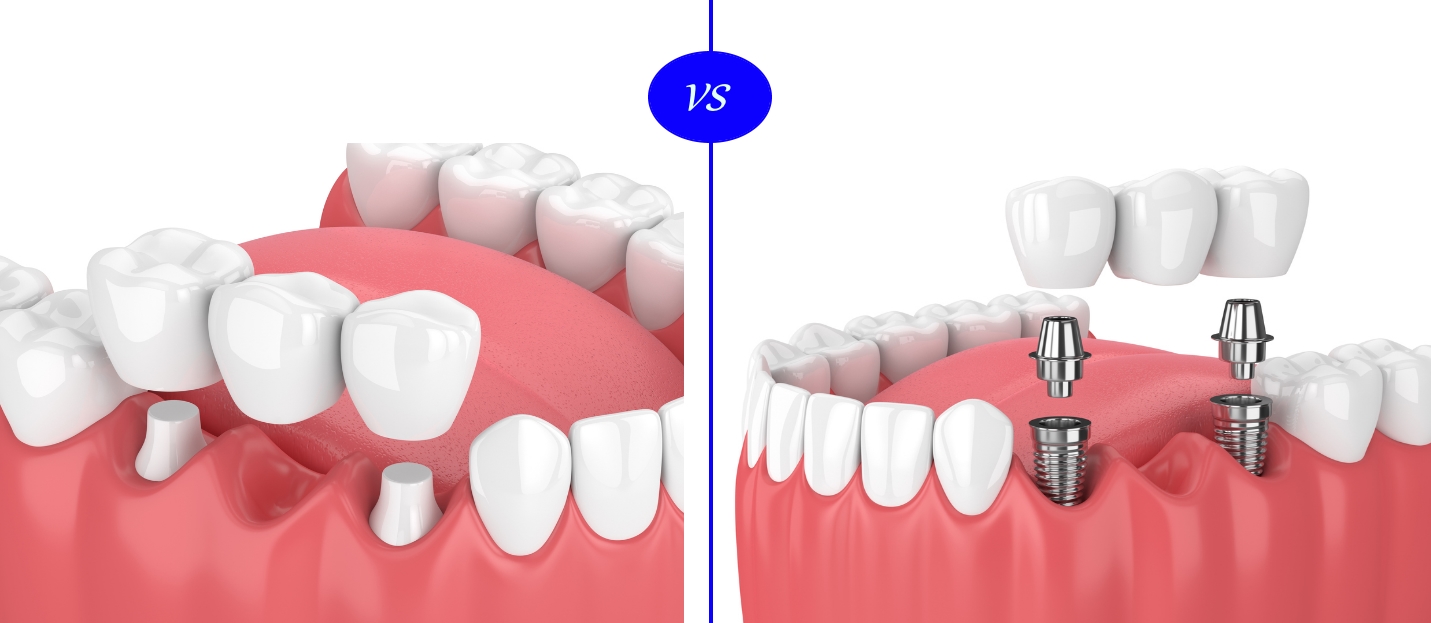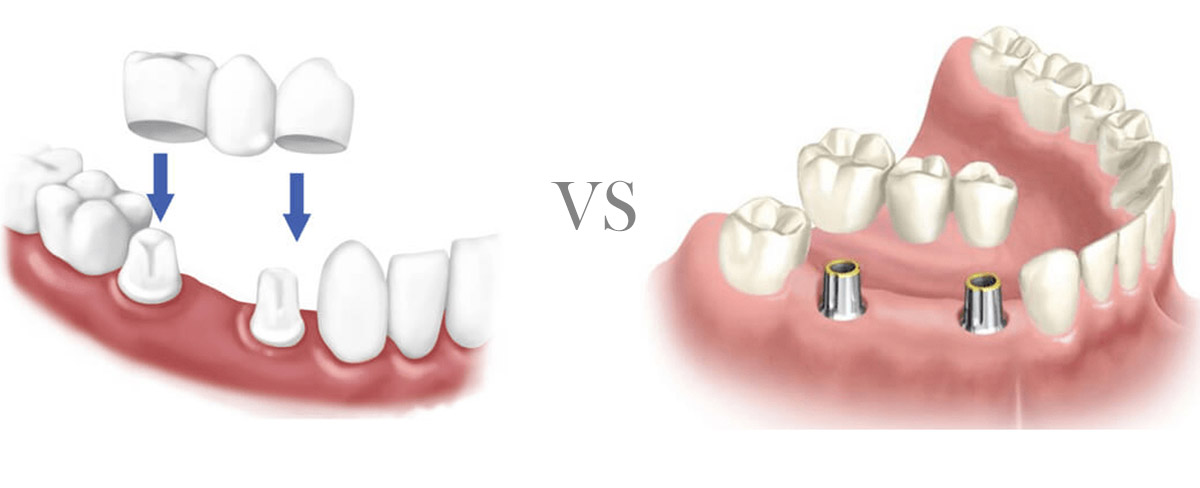
Dental Implants vs. Bridges: Making an Informed Decision
When it comes to replacing missing teeth, making the right choice can significantly impact your oral health, aesthetics, and overall well-being.
Dental implants and bridges are two popular options for tooth replacement, each with its own set of advantages and considerations. To make an informed decision, it's essential to understand the difference between a bridge and an implant and how they align with your unique needs and circumstances.
Understanding Dental Implants
Dental implants have emerged as a contemporary and remarkably efficacious remedy for the replacement of missing teeth. The construction of a dental implant comprises three fundamental components: the implant post, the abutment, and the crown.
Dental implants are diminutive titanium posts that undergo surgical implantation into the jawbone, assuming the role of artificial tooth roots. Over the course of time, the implant forms a fusion with the bone through a process known as osseointegration. This natural integration bestows a stable foundation upon which a replacement tooth can securely perch.
The implantation process entails a surgical endeavour. A dentist or dental surgeon commences by making a precise incision into the gum tissue, thereby exposing the underlying jawbone. With the utmost precision, they meticulously craft a socket and then gently embed the implant post. Following this, the gum is delicately sutured back into place, and a period of convalescence takes its course.
Subsequent to the integration of the implant with the jawbone, an abutment becomes affixed to the implant, functioning as a vital connector for the ultimate crown. The final touch involves the placement of a dental crown onto the abutment, thus culminating in the fabrication of a replacement tooth that embodies both natural aesthetics and functionality.

Understanding Dental Bridges
Dental bridges surface as an alternate avenue for tooth replacement, particularly tailored for those who find themselves bereft of one or more contiguous teeth.
Dental bridges manifest as ensembles consisting of one or more artificial teeth, commonly referred to as pontics, which remain anchored in position by adjacent natural teeth or dental implants. These supportive natural teeth are designated as abutments, and they shoulder the pivotal responsibility of lending support to the bridge.
Traditional dental bridges typically feature porcelain or ceramic materials, skillfully mirroring the appearance of natural teeth. The abutment teeth flanking the vacant space are prepped by the removal of a portion of their enamel to accommodate dental crowns. These crowns act as steadfast anchors, securely upholding the pontic or pontics that span the gap.
Aesthetics and Natural Sensation
In the realm of both dental implants and bridges, a key consideration revolves around the aesthetics and the extent to which they offer a natural semblance and sensation when meticulously tailored and fitted as part of the pros and cons of dental bridges.
Dental implants take pride in their capacity to bestow exceptional aesthetics. Since they are individually placed, they operate independently of adjacent teeth for support. The crowns, carefully crafted to mirror the shape, colour, and alignment of your native teeth, usher in a harmonious integration with your smile.
Dental bridges, while competent in delivering a natural appearance, hinge on the quality of the dental crowns and the proficiency of the dentist in crafting a harmonious fit. It is imperative to recognize that the stability of bridges may not attain the same as that of implants, primarily because they are reliant upon adjacent teeth, the uniformity of which can significantly influence the overall aesthetic outcome.
Longevity and Endurance
As you weigh the decision of tooth replacement options, a pertinent facet pertains to the lifespan and robustness of these solutions.
Dental implants have gained repute for their tenacity. With diligent upkeep and care, they can stand the test of time, sometimes enduring for a lifetime. The implant post itself exhibits remarkable durability, while the crown perched atop is resistant to decay and staining.
Dental bridges, though resilient in their own right, typically harbour a more limited lifespan when juxtaposed with dental implants. While they can persist for numerous years under optimal care, the wear and tear exerted on the abutment teeth and the materials used in the bridge may necessitate periodic replacements.

Implications for Bone Health
The impact of dental implants and bridges on the health of the underlying bone represents a pivotal factor for consideration.
Dental implants wield a significant advantage with their ability to stimulate the jawbone, mimicking the role of natural tooth roots. This stimulation serves to augment bone density and deter bone loss, thereby preserving the overall health and structural integrity of the jawbone.
In contrast, dental bridges are less adept at instigating bone stimulation, as they draw support from adjacent teeth rather than directly interfacing with the bone. This stimulation can, over time, potentially culminate in bone resorption in the vicinity of the absent teeth.
Maintenance and Care
The enduring functionality of both dental implants and bridges hinges upon vigilant maintenance and care.
Maintaining dental implants is, in essence, a relatively straightforward endeavour. Routine brushing, flossing, and regular dental check-ups typically suffice to preserve the condition of your implants. Implants necessitate no distinct cleaning or upkeep procedures beyond the customary care accorded to natural teeth.
In the case of dental bridges, meticulous oral hygiene becomes imperative to avert decay or injury to the abutment teeth. Specialized flossing instruments or interdental brushes might be enlisted to meticulously cleanse beneath the bridge. Regular dental examinations serve as a linchpin in overseeing the condition of the bridge and the abutment teeth.
Cost Comparison
Cost, undeniably a pivotal consideration, looms large in the decision-making process when contemplating implant vs bridge cost.
Dental implants often inaugurate with a loftier initial price point, primarily owing to the surgical procedure entailed, encompassing implant placement and the bespoke crafting of crowns. However, the longevity of implants and the potential abatement in long-term maintenance expenditures can render them a judicious and cost-effective choice over the course of time.
Dental bridges, conversely, may present a more economical upfront cost when measured against implants, principally because they circumvent the necessity for surgery. Yet, it is paramount to factor in the prospective future expenses for implant vs bridge cost replacements and upkeep, which can accumulate over the years.

Potential Hazards and Complications
As with any medical procedure, both dental implants and bridges harbour potential risks and complications that warrant consideration.
Dental implants, while generally safe, may occasionally give rise to risks such as infection, implant failure, nerve damage, or sinus issues, particularly when placed in the upper jaw. These risks, however, are relatively infrequent, particularly when entrusted to the competence of a seasoned and adept dentist or oral surgeon.
Conversely, dental bridges may present complications such as decay or harm to the abutment teeth, which may necessitate further intervention. Additionally, bridges might, over time, exhibit symptoms of looseness or dislodgment. Regular dental assessments serve as a pivotal conduit for the timely detection and resolution of any potential issues.
Personalized Consultation with a Dentist at Skymark Smile Centre
Ultimately, the decision between bridge vs implant should be based on your individual needs and circumstances. It is crucial to consult with a dentist to assess your oral health, discuss your goals, and receive personalized advice.
At Skymark Smile Centre, our experienced team of dentists is dedicated to helping you make an informed decision about tooth bridge vs implant replacement. We understand that every patient is unique, and we will work closely with you to determine tooth implant or bridge which is better and restore your smile and oral function.
Don't leave your tooth replacement decision to chance. Schedule a dental bridge vs implant consultation with our skilled dentists at Skymark Smile Centre today to explore your implants vs bridge work options and achieve the confident, healthy smile you deserve.
If you're considering bridge or implant tooth replacement options, don't hesitate to reach out to Skymark Smile Centre. Our team of expert dentists is here to provide personalized guidance and ensure you make the right choice of dental implants versus bridges for your oral health and well-being. Contact us today to schedule a bridge versus implant consultation, and take the first step towards a beautiful and functional smile.

